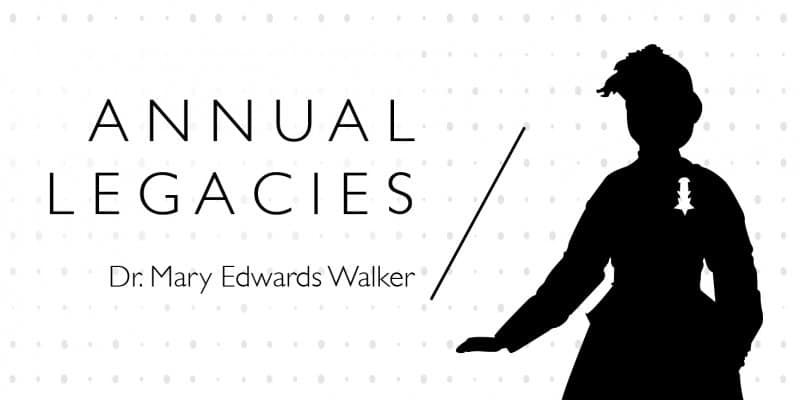There are thousands of legacies housed within the American Civil War Museum, and the Annual Fund helps to provide critical funding for all the things the museum needs to preserve and tell them. It helps fund the preservation of the over 15,000 artifacts in our care, allows our educators to create different programs for school children and continues our public programming. It helps to keep our lights on. Your funding is imperative, and we want to thank you for your interest in and support of the Annual Fund.
Below is one of the stories you’ll help preserve, one of which is featured briefly in our Fall Annual Fund letters. The hope for this blog post is that you will learn more about those featured, as well as the effects of the Civil War and its aftermath on three very different legacies.
Born in 1832, Mary Edwards Walker was raised by a progressive family on a farm in Oswego, New York. She and her six siblings were raised to be free thinking, and their parents started the first free school house in the county to ensure their daughters would have the same education as their son. Mary attended Falley Seminary School and later Syracuse Medical College, where she graduated as a doctor of medicine in 1855. She worked in private practice in New York until the outbreak of the Civil War when she went to Washington and volunteered in hospitals for the U.S. effort. Walker set up the Women’s Relief Organization to assist with families of wounded soldiers in the hospitals and worked as a nurse in Washington until 1862. After traveling to Virginia and volunteering under Major General Ambrose Burnside, she worked as a field surgeon to care for wounded soldiers at Warrenton and Fredericksburg. Later that year she went to Tennessee to tend casualties from the battle of Chickamauga where, in September 1863, she was appointed as ‘Contract Acting Assistant Surgeon (civilian)’ by the Army of the Cumberland, making her the first female surgeon hired by the Army. She served for only a short time longer, until April 1864, when she was captured as a spy by Confederate troops while assisting a Confederate doctor with an amputation. She was taken to Richmond, and imprisoned in Castle Thunder until she was exchanged for a Confederate surgeon in August of the same year. Her time as a field surgeon before being imprisoned was the last time she saw active battle in the war before she officially left government service in November 1864.
Dr. Walker was awarded the Congressional Medal of Honor in 1865 by President Andrew Johnson. The U.S. government rescinded her medal in 1917, along with over 900 others, when terms of eligibility for the medal were changed; her civilian status through the war meant she was no longer eligible to receive it. She would continue to wear it as a precedent for the next two years until her death on February 21, 1919.
Throughout her life Mary Edwards Walker worked to further the suffrage and feminist movements as well as being a supporter of the abolition of slavery. She has been recognized by various military and non-military organizations through the years for her service during the war, as well as furthering early women’s movements. President Jimmy Carter reinstated her Medal of Honor in 1977, and she remains the only woman to have ever received it.
Every legacy of the Civil War should be preserved and told. A gift to the American Civil War Annual Fund allows us to not only conserve the artifacts under our care, it allows us to share the legacies of the people that owned them and the impact the Civil War had on them as well as their impact on us now. Please consider a donation to the fall Annual Fund. To donate online, simply click the red ‘DONATE’ button at the top right corner. You can also send a check to American Civil War Museum, attn: Kathryn Lewis, at 490 Tredegar Street, Richmond, VA 23219. Thank you.
